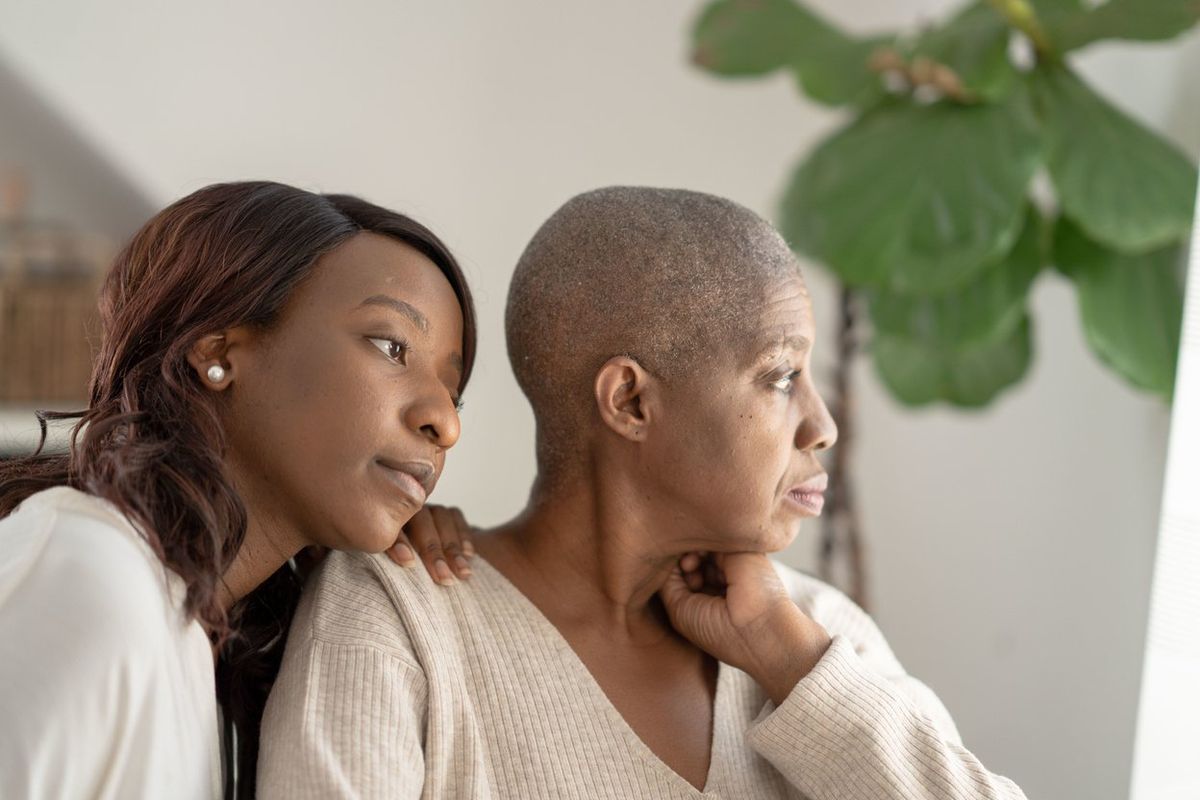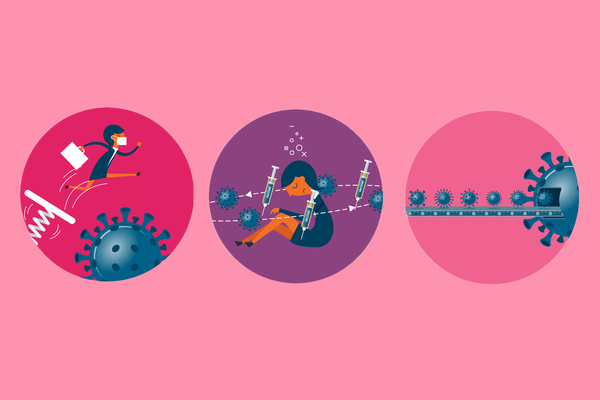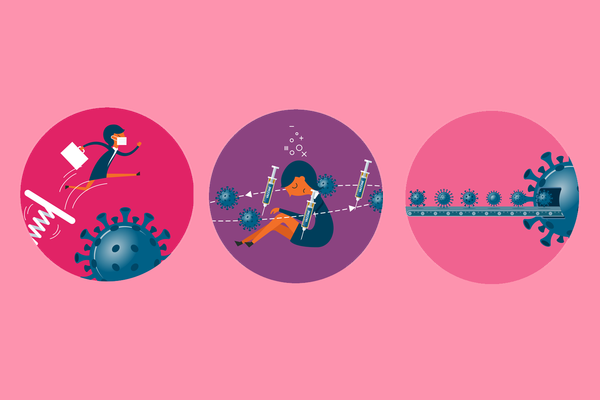In July 2021, Latoya Bolds-Johnson, a physician assistant from the Washington, D.C., area, was diagnosed with stage 3 triple-negative breast cancer (TNBC). Because of her medical background, Bolds-Johnson knew early into her treatment that she wanted to participate in a clinical trial. But her oncologist never brought up a clinical trial and shut down the idea when she brought it up.
“I would email him about different trials and he would dismissively say I didn’t qualify. It just wasn't even a consideration at all,” said Bolds-Johnson.
Then Bolds-Johnson attended a conference that introduced her to a new immunotherapy drug for people with TNBC. After learning that most people she talked to had received a clinical trial for this medication, Bolds-Johnson found a new female oncologist who is also a woman of color. After collaborating with her new oncologist, Bolds-Johnson is now participating in a clinical trial that is right for her.
Bolds-Johnson’s story sadly reflects the realities of many Black and Hispanic women who can not easily access potentially life-saving clinical trials for their breast cancer. Researchers in one study found that Black participants were underrepresented by 38% in breast cancer studies. And, despite accounting for 13% of the population, only 2% to 9% of Black women participated in clinical trials for breast cancer that led to the approval of four new breast cancer treatments in 2020. Similarly, Hispanic or Latin Americans make up almost 20% people in the U.S. population, but were 0% to 9% of participants in those same trials.
Clinical trials are so important because many of the drugs and immunotherapies they offer represent the latest research, and the treatments can be more effective than standard cancer treatments. Approximately 25%–30% of drugs used in phase 3 clinical trials end up approved by the Food and Drug Administration (FDA). So, a lack of representation in breast cancer clinical trials means fewer Black and Hispanic women can access cutting-edge treatments that could save their lives.
“While Black women are not diagnosed at the highest rate, we are [about] 40% more likely to die of breast cancer,” said Monique Gary, M.D., a breast surgical oncologist and medical director of the Grand View Health/Penn Cancer Network Cancer Program. Black patients have the highest likelihood of dying from breast cancer and unfortunately clinical trials don't reflect that.
Gary said poor communication is part of the problem. “The number one reason that Black women are not enrolled in clinical trials is because they simply are not asked to be a part of the trials.” Gary said.
Read “We Need More Black Women in Clinical Trials” >>
Why aren’t Black people participating in breast cancer clinical trials?
A survey from the Metastatic Breast Cancer Alliance found that 8 out of 10 Black people living with metastatic breast cancer were open to participating in a clinical trial. Yet, only 5 out of 10 reported even knowing about a trial occuring and only 4 out of 10 reported having a member of an oncology team notify them about one. While there is a history of medical mistrust in the Black community, it seems that a lack of awareness rather than mistrust drives much of the underrepresentation.
Another major factor driving low representation in clinical trials stems from the lack of trials available in community clinics that serve Black and Hispanic people with cancer.
“People of color are more likely to get their cancer care at their community institution — even when there are National Cancer Institute (NCI)-designated cancer centers in their vicinity,” Gary said. “They want to go with more doctors and staff that look like they do,”
Another hurdle: Many clinical trials have criteria that can exclude Black and Hispanic women.
“Trials exclude candidates with [two or more health conditions], like hypertension, that are very prevalent among Black people,” said Damé Idossa, a breast oncologist and assistant professor of medicine at the University of Minnesota School of Medicine.
Many pharmaceutical companies won’t use people in clinical trials who have other medical conditions because they worry about how the experimental therapy may interact with other medications or affect other medical conditions.
However, this exclusion doesn’t keep in mind the people who will actually be taking the medicine. For example, a Black woman with diabetes may be excluded from a clinical trial for a particular medicine, but she would still likely be prescribed the medication once it's FDA-approved. This means that many Black patients may take medications that could lead to negative reactions to the other conditions they haven’t been studied.
Even for women who have knowledge and access to trials, significant indirect costs, especially time and money, can make it difficult for them to participate.
“From a patient factor standpoint, it [takes] a lot to be on trials. The treatments are free, but there are more blood draws and imaging. There might be indirect costs that you don't always think about like taking more time off of work, paying for parking and gas or finding childcare for patients with kids,” Idossa said.
Lack of diversity in clinical trials leads to less personalized care
A lack of diversity in clinical trials also limits opportunities for personalized medicine and care for Black and Hispanic patients with breast cancer. For example, between 5–10 of 100 cases of breast cancer stem from hereditary genetic mutations — most commonly on the BRCA1 or BRCA2 gene. Personalized medicine aims to diagnose and treat breast cancers, using the genetic makeup of a patient and the genes in the cancer cells. But most of that data is not representative.
According to Idossa, a lot of what we know about genetic mutations comes from a European population that didn’t have a lot of variety in their DNA. She added that when non-white patients undergo DNA testing, they can sometimes receive a variant of unknown significance (VUS) result, because it's often based on European standards.
A VUS result means that a mutation was found during genetic tests, but it's unknown whether it's a noncancerous mutation or one related to causing cancer. Research has shown that Hispanic and Asian women have the highest number of VUS results, and Black women have the highest rates of VUS results that ultimately are related to cancer.
“You can't personalize medicine to a genome that you don't have and to a biology that you don't understand,” Gary said. “And so our treatments will be less and less refined, because our disease is poorly understood.”
Solutions for the future of cancer clinical trial diversity
There are steps the medical and pharmaceutical industries can take to make breast cancer trials more inclusive.
For starters, Gary and Idossa said pharmaceutical companies can engage in partnership with community organizations that Black and Hispanic breast cancer patients go to the most.
“There needs to be a focus on intentionality with how we train people and have the personnel that can actually do these trials in communities, clinics and hospitals where most of our patients are actually living,” Idossa said.
Companies running clinical trials need to invest more in marketing to and educating communities that need these trials.
Idossa said researchers should aim to build deep and meaningful relationships with marginalized communities. Having a longstanding and trustworthy relationship beforehand can make it easier to increase participants' trust in trials and make it easier to have Black and Hispanic women recruited into clinical trials.
Healthcare providers (HCPs) also need to check implicit biases and communication styles. HCPs should offer information to cancer patients without deciding for themselves if a patient would be interested or a good candidate.
“It’s up to us now to make the steps necessary to take those steps to now engage [Black and Hispanic patients] into these trials. The people are ready. I think we have to capitalize on that moment,” Gary said.
Unfortunately, disparities in breast cancer have existed for years, but we now have the chance to make tangible changes that can help save more lives and give Black and Hispanic people with breast cancer the care and treatment they deserve.
This resource was created with support from Merck.
- Clinical Trials ›
- Why Women Are Needed in COVID-19 Clinical Trials ›
- We Need More Black Women in Clinical Trials ›
- COVID-19 and the Growing Importance of Diverse Participation in Clinical Trials ›
- Why Diversity in Clinical Trials Is Important ›
- What You Need to Know About Clinical Trials - HealthyWomen ›
- Lo que debes saber sobre los ensayos clínicos - HealthyWomen ›
- Soy inmunodeficiente y un ensayo clínico cambió mi vida - HealthyWomen ›
- I Was Immunocompromised and a Clinical Trial Changed My Life - HealthyWomen ›
- Congressional Briefing: Women in Clinical Trials - HealthyWomen ›






